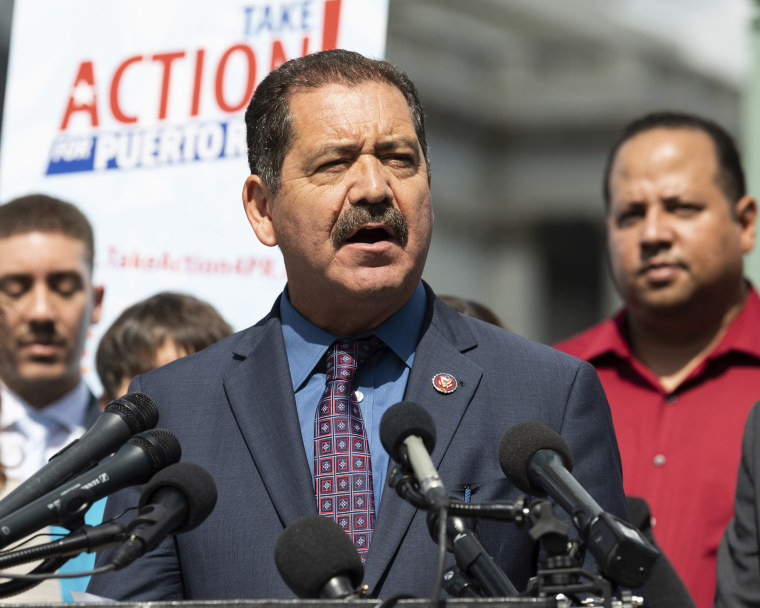Asian American community advocates say a new immigration reform bill reintroduced in Congress on Tuesday can become a pathway for Southeast Asian Americans who have been deported to return to the U.S. or who are in deportation proceedings to stay in the country.
The New Way Forward Act, co-sponsored by 34 Democrats in the House and endorsed by more than 300 organizations, seeks to decriminalize immigration and tackle systemic racism in the country's immigration system.
Kham Moua, director of national policy at the civil rights advocacy nonprofit Southeast Asia Resource Action Center (SEARAC), one of the organizations endorsing the measure, said the bill would also allow some individuals who have been deported to reopen their cases and potentially return to the U.S.
“Right now there isn't really a pathway back for those who have been deported because of certain convictions," Moua said.
The bill was originally introduced in 2019 by Rep. Jesús “Chuy” García, D-Ill. and co-written by Reps. Pramila Jayapal of Washington, Ayanna Pressley of Massachusetts and Karen Bass of California, all Democrats. It addresses the impact of two 1996 laws — the Illegal Immigration Reform and Responsibility Act, and the Anti-Terrorism and Effective Death Penalty Act — on immigrant communities. The laws established mandatory detentions and deportations; expanded the definition of what types of crimes could result in detention and deportation; allowed for that broader definition to be applied retroactively; and restricted judicial discretion for many immigration cases.
“At this moment in history, we’re called to uphold our values of compassion, common humanity and racial justice,” García said Tuesday during a virtual news conference reintroducing the measure. “This is the moment to reimagine an immigration system rooted in justice and compassion.”
The New Way Forward Act would also redefine convictions and restore judicial discretion, ensuring immigration judges are no longer forced to automatically deport individuals, Jayapal said at the news conference.
Under the Trump administration, Southeast Asian Americans saw a rise in detentions and deportations. From fiscal years 2017 to 2018, Cambodian nationals saw a 279 percent rise in deportations. In fiscal year 2020, Immigration and Customs Enforcement (ICE) deported 93 Vietnamese nationals — up from 80 in fiscal year 2019. Laotian and Hmong refugees early last year prepared for the possibility of an increase in deportations following news that the U.S. government was funding a reintegration program to help Laos accept nationals with final orders of removal.
The impact of deportations extends beyond individuals in proceedings or those who have been deported. A 2018 report detailed the emotional, mental and financial toll it takes on community members who are separated from their families through deportation.
Chanthon Bun, a Cambodian refugee facing deportation, said the New Way Forward Act would help keep families together.
“What ICE is doing now is traumatizing not just me, not just the person that is incarcerated, but the family, the community,” he said Tuesday at the news conference. “I hope that we can pass this and reform all the 1996 laws and keep families together.”
As of Jan. 16, the United States had seven Cambodian nationals, 24 Laotian nationals and 61 Vietnamese nationals detained, ICE spokesperson Danielle Bennett said in an email. And approximately 15,000 Southeast Asian Americans have a final order of removal: about 1,800 Cambodians, about 4,900 Laotians and about 8,700 Vietnamese nationals, Bennett said. About 80 percent of those orders of removal are based on past convictions, according to SEARAC.
At least four Cambodian deportees are known to have returned to the U.S. because of changes in immigration laws, and advocates are continuing to push to allow more to return.
While the New Way Forward Act did not become law after its introduction in 2019, it started a much needed conversation around the country’s immigration and criminal justice systems, Garcia said.
He added that the immigration proposal President Joe Biden put forth on his first day in office addressed some of the concerns the bill raised, which has been encouraging for advocates.
“I think we set the bar high for the new administration on what we envision as a fair and humane immigration system,” he said.
Katrina Mariategue Dizon, acting executive director of SEARAC, said the group didn’t expect it to pass in 2019, but called its introduction a victory for many community members who could potentially benefited from it.
She added that there's more hope and excitement among community members with regard to immigration issues under the Biden administration.
“I just feel like this time around, there’s just so much more cohesion and coordination with our allies and our different partner organizations,” Dizon said. “So I’m just looking forward to seeing how far we can push on immigration reform.”
